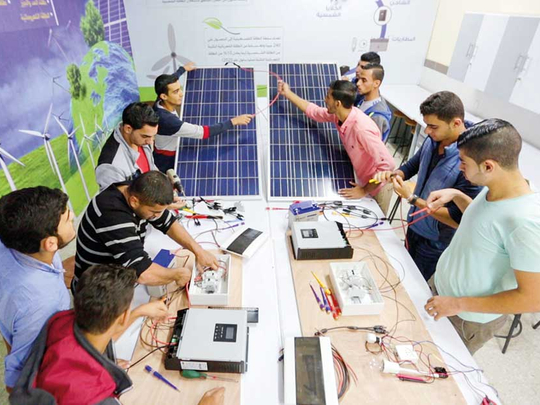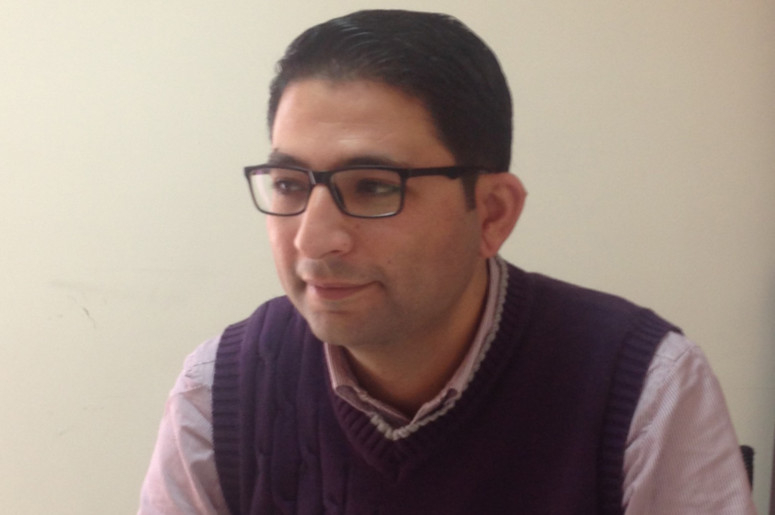
Palestine’s youth, who make up 61 per cent of the population, harbour dreams and aspirations in an economy under an occupation. With the unemployment rate in the group aged between 18 and 29 at 44 per cent and the highest in the Mena region, Taawon is facing a daunting task.
Taawon is the Welfare Association, an independent non-governmental organisation that was founded in 1983 by a group of Palestinian business leaders and intellectuals to support the sustainable development of Palestinians in the West Bank including occupied Jerusalem, the Gaza Strip, 1948 areas and refugee camps in Lebanon. Back in 2009, Taawon launched YES — its Youth Empowerment Services programme to address this very challenge.
“The YES programme is one of seven programme-led approaches we have adopted at Taawon,” says Mahmoud Nazzal, the Programme Manager. “Its primary purpose is to contribute to building a youth Palestinian economy and facilitate entrance to the job market for them. Our target group is graduates from universities, technical and vocational schools. We maintain a 50-50 gender ratio and give priority to people with disabilities as well as women.”
So how does the programme work?
“The education system doesn’t provide needed skills for the market, and we are trying to play an integral part by adding life skills and personal competencies, meaning community and environmental awareness, effective work habits, tolerance and values,” Nazzal explains. “We match them with companies through an online portal that we established in 2011. This has proven to be a win-win for all. Most importantly, it’s about seeking first employment for the graduate, which is generally very hard to do as economic hurdles are high and life experiences and salaries are low.”
It’s working. YES statistics show 76 per cent of participants obtain permanent jobs at the same company or another.
“Fifty-eight per cent of our beneficiaries are women,” he says “The portal has the advantage of geographical reach. We learned that Nadia from A Araqa, a remote village in the north, was able to obtain a job nearby, which was received with much appreciation.”
To date, more than 25,000 job seekers have registered on the portal and more than 2,600 companies or employers have done likewise. About 7,800 have been matched with 2,100 employers in the West Bank and occupied East Jerusalem alone.
“The YES programme in Gaza has another scope of work,” he explains. “Taawon was the first to support the idea of entrepreneurship in Gaza by launching the pioneering incubator Mobaderoon in 2010. The YES programme has supported more than 600 entrepreneurs by providing skills, knowledge and seed funds to start their projects, with more than 100 start-ups launched.”
Despite poor economic conditions, many of start-ups have been successful, employing youth and making profits. Most importantly, many of the trained youth through Mobaderoon now work as freelancers with employers from Europe, US and Gulf countries, especially in the IT sectors.
“We have other incubators in Hebron and in occupied Jerusalem providing entrepreneurial skills needed for the candidate entrepreneurs, and seed funding to help them initiate the establishment of their businesses,” Nazzal says.
“The YES programme has partnered with the Leaders organisation in Ramallah to launch the first business accelerator in Palestine,” he says. “Fast-Forward, whose purpose is to take an idea, add $20,000 to $30,000 of development to it in order to speed up the process as venture capitalists await the next big idea. This accelerator’s work has led to five deals with investments of $1.5 million.”
The YES programme also brings together the private sector, students, NGOs and donors with workshops in Palestinian universities by facilitating speakers from Silicon Valley to inspire young Palestinians.
But Palestine’s main economic activity is agriculture. Is YES ignoring this?
“We have partnered with the Palestinian Agricultural Development Association by supporting it with several projects with focus on women,” Nazzal says. “We are fast forwarding technologies in agriculture by enhancing the pipeline of agriculture and IT graduates in the field of food processing and farming in water, which resulted in the first such farm in Palestine, and recently the launch of the first agri-business accelerator.”
Taawon also seeks to reinforce the economic dimension and cooperation with the Palestinian diaspora by supporting and developing virtual work opportunities to address the youth employment challenge in Palestine, and by matching graduates with regional and international markets.
“We help design projects, provide seed funding and training to translate an idea into fruition. Funds or loans are revolving with zero interest,” he says.
Another component of the YES programme is DAIMN project (Diaspora Angel Investors and Mentors Network), which is a project jointly funded by Taawon and KOICA (Korea International Cooperation Agency), which aims to create a network of potential impact investors from the diaspora with up and coming tech start-ups in Palestine to provide guidance and skill experience that will contribute to the success of entrepreneurs and local start-ups, Nazzal explains.
“This project supports the development of innovative and creative capabilities of Palestinian entrepreneurs by providing them guidance and mentorship to take their start-ups or projects to the next level,” he says. “The Palestinian diaspora has the potential to contribute knowledge, expertise and skills along with investment and mentoring capabilities to support projects and initiatives aimed at developing multiple sectors throughout the West Bank and Gaza.”
Nazzal explans that the developmental process also includes a Social Impact Initiatives programme, which is based on social impact investing. “This type of investing combines philanthropy and traditional investments to produce a positive societal impact with modest returns on investment,” he says. “In Taawon’s case, any returns from investments will be reinvested through the fund revolving in new initiatives. This new method of development is different from providing grants, where Taawon will be investing in ideas or existing for-profit companies, and owning equity shares in them.”
By following this method, Taawon would achieve its philanthropic goals that are not based on profit, while providing sustainability of the programme.
During the past eight years, YES had invested more than $21 million with much success, and 40,000 youths have benefited from the programme. In all, 9,200 new graduates have secured jobs in the local market and YES has supported the establishment of 720 business start-ups employing 1,200 youths. Another 3,000 youth in occupied Jerusalem have been supported with integrated social services, and YES established three business incubators and two accelerators. All told, the cumulative efforts of YES have led to an aggregate annual income of more than $50 million in permanent jobs and entrepreneurships.
YES has adopted a pragmatic and holistic approach to tackling the unemployment issue of Palestinian youth by investing in entrepreneurship and creating virtual work to increase youth employability with a measure of real success.
Rafique Gangat, author of Bending the Rules, is based in Occupied Jerusalem.













